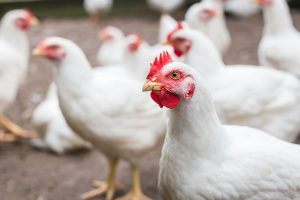Recently, Perdue Chicken released a video ad about antibiotic usage and competitor companies’ choices to move from the “no antibiotics ever” (NAE) to a production program that’s more aligned with best animal welfare practices. And this ad was quite disappointing.
While I have long respected Perdue Farms and their efforts to be a leader in animal welfare in the poultry industry sector, I recently lost some respect for Perdue in its published commercial concerning a competitor who has chosen to adjust its NAE program.
So, let’s unpack this and look at some issues in this latest advertisement. There is a lot of false and misinformation about animal agriculture and agriculture in general that we fight daily. The main reason is that only 1.3 percent of the American population is involved in agriculture, with an average population of 340 million, according to the U.S. Census Bureau. There are many reasons this has happened over the years, but it has created a massive disconnect between the understanding of our food source and the consumer.

This disconnect has created a culture of misinformation aimed toward the agriculture industry, and the most affected by this misinformation is animal agriculture. The Perdue commercial does not help with a transparent message but leads the consumer to believe the competitor has engaged in unethical antibiotic usage. That leads the consumer to project this practice as standard in the food animal industry.
Companies such as Perdue have a direct and moral obligation to convey truthful and transparent information that doesn’t lead consumers to false assumptions to slander a competitor, play on the consumer’s emotions, and take advantage of the disconnect most of the population has with agriculture.
At this point, I must say, Perdue Farms, shame on you for adding to the problem and not taking the opportunity to be transparent to the consumer and not lead them to a false conclusion about other companies’ production practices.
Let’s examine a few examples of how misleading ad campaigns cause issues. Have you looked at a package of chicken in the grocery store, and it says “non-GMO?” The label isn’t technically false, but it’s misleading. I have asked many people what they think when they see this.

The response is companies who don’t label “non-GMO” are chickens that are GMO, and they migrate and purchase a product with a “non-GMO” label and at a higher cost most of the time.
So, what’s the problem? The problem is that there is no such thing as GMO poultry. They don’t exist, and the label leads the consumer to a false conclusion that poultry companies use GMO poultry. GMOs also have many benefits — but fear sells — and people against GMOs likely don’t even know what they are or be led down a tunnel of well-funded disinformation campaigns.
Some other disturbing trends the average consumer believes through misleading information with advertisements or labeling. Seventy-six percent of the population believes that hormones and steroids are used in poultry production. That’s false: The use of hormones and steroids has been against the law since 1956.
Seventy-five percent also believe there are antibiotics in the chicken protein they purchase. This is also false: The USDA mandates through law that there is a withdrawal time before processing for human consumption if the animal has been treated for diseases in its life cycle.
Here is one statement I particularly want to hone in on: “Eliminating antibiotics leads significantly to more chickens dying from disease?” Forty-nine percent of respondents indicated this was true, while 54% said it was false. (Karavolias, 2018).
The withholding of antibiotics to sick chickens could arguably be the worst consumer-demanded production practice that has ever happened in animal agriculture. When our children get sick, we take them to the doctor, and if needed, the doctor gives the child antibiotics to handle the infection. If a chicken gets sick, the mortality must be severe before the company vet prescribes antibiotics.
Then, the chickens will no longer be on the no antibiotics market. Many consumers believe the no antibiotics practice is for the betterment of the animal, but in reality, it’s animal cruelty at the highest level.

Suppose American consumers could see what this production program does to the health and well-being of the animals. In that case, I believe the consumer or animal welfare activist would demand a change. There is no antibiotic residue in the meat proteins at the time of processing if the animal was ever treated with antibiotics in its life cycle, so why is this level of cruelty being allowed?
Why is Perdue continuing this practice and slandering a competitor who is more interested in animal welfare and the financial health of the local family farmer who must deal with this cruel practice and negatively affect their income from the loss of chickens because of this practice? Yes, the producers are your local family farmer.
By the way, poultry is tested for residue before it is processed to verify. Please read scholarly peer-reviewed scientific articles such as Raised without Antibiotics: Impact on Animal Welfare and Implications for Food Policy.
There are five freedoms that the animal agriculture industry practices, and I have recently thought these five freedoms aren’t being followed.
- Freedom from Hunger and Thirst
- Freedom from Discomfort
- Freedom from Pain, Injury, or Disease
- Freedom to Express Normal Behavior
- Freedom from Fear and Distress.
Perdue recognizes the five freedoms, and for the most part, they are followed, but with the no antibiotics program, the freedom from disease and distress is not followed. We cannot have a healthy animal if we cannot treat the illnesses in a reasonable period before the illness is so severe that there is a massive mortality.
Unlike the Perdue commercial implies, medications or antibiotics aren’t being thrown at animals indiscriminately as growth-promoting or preventative treatments and whatever they deem as needed.
The part about “throwing” antibiotics at an animal without consideration of due process and best practice is misleading to the consumer. It doesn’t happen. Perdue, what are you thinking? I would love to hear the rationale behind this kind of campaign.
Michelle Miller, the “Farm Babe,” is an internationally recognized keynote speaker, writer, and social media influencer and travels full-time to advocate for agriculture. She comes from an Iowa-based row crop and livestock farming background and now resides on a timber farm in North Central Florida.



